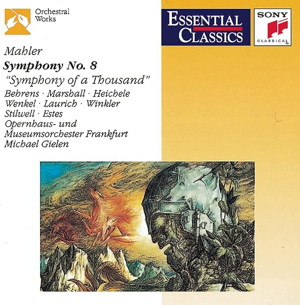
Gustav Mahler (1860-1911)
Symphony No. 8 (1906)
Magna peccatrix: Faye Robinson (soprano I)
Mater Gloriosa: Margaret Marshall (soprano II)
Una poenitentium: Hildegard Heichele (soprano III)
Mulier Samaratina: Ortrun Wenkel (alto I)
Maria Aegyptiaca: Hildegard Laurich (alto II)
Doctor Marianus: Mallory Walker (tenor)
Pater ecstaticus: Richard Stilwell (baritone)
Pater profundis: Simon Estes (bass)
Figuralchor Des Hessischen Rundfunks; Frankfurter Kantorei; Frankfurter Singakademie; Limburger Dom-Singknaben
Opernhaus- und Museumsorchester Frankfurt/Michael Gielen
rec. live, 28 August 1981, Alte Oper, Frankfurt, Germany
Sony Classical SBK48281 [72]
I was attracted to this, the earlier of Gielen’s recordings of Mahler’s Eighth Symphony (the other is with the SWR twenty years later), by the name of Margaret Marshall, a favourite singer, and a couple of other artists in the cast list; I also noted that apart from a mention of it Tony Duggan’s survey as a good bargain option – less so, now, since price increases – it doesn’t seem to have had much exposure. I quote here TD’s comments:
“Gielen is always an interesting Mahlerian, stressing the more modern aspects of his work, “head” rather than “heart”, which might not be the best approach to the Eighth when compared with other, more exalted readings. But it certainly has its place. All the same, if this is all you can afford you could do a lot worse than this. Bernard Haitink’s version, for example, also at around the same price on Phillips, should be avoided as just dull which is no mean feat in this work. Gielen’s version also has the benefit of being recorded “live” and there’s a sense of occasion to be had from his quite brisk, direct, open-faced reading I rather like as a supplement to my main choices.”
Dan Morgan also prefaces his more recent review of volume 7 of the Michael Gielen Edition by observing, “after just a few minutes…I knew he was the genuine article. I’m still very fond of that performance, and would recommend it to anyone who wants to explore this great work.”
Let me first deal with two possible weaknesses: first that this is live and thus prone to accidents, being a notoriously complex score. That does not seems to be a factor here at all; it could just as easily have been a studio production, apart from the occasional faint cough. Secondly, it was recorded in analogue just before the dawn of the digital age – yet it is remarkably clear and immediate; the Hessiger radio station did a fine job capturing the grandeur of the occasion: the reopening of the Alte Oper.
A third area of concern will always be the quality of the soloists. Alarm bells ring for me when I see the name of the tenor as his weedy crooning almost fatally vocally compromises Solti’s recording of Beethoven’s Missa solemnis three years earlier. He is better here, even if he is hardly heroic and I think it a pity that as Dr Marianus he has more to do than any other soloist, as his “white”, plaintive timbre decidedly makes him “the weakest link”, whereas Simon Estes’ powerful bass very satisfactorily underpins the density of voices. The ladies might not feature star names but they are tremendous and the massed choirs mightily impressive, too; the conclusion to Part I is as thrilling as any I know, with the lines of both the soloists and the choirs audible yet well co-ordinated.
Gielen directs without artifice or pretension; fast and direct in manner, this performance is devoid of showy gestures and appeals to those listeners who prefer to avoid what they hear as the kind of over-emoting which characterises, for example, Bernstein’s renditions. Some might find that the “Accende lumen” passage (track 6) borders on the rushed but it is certainly breathlessly exciting.
The orchestral introduction to Part II is urgent yet haunting and again, balances are very good; the pizzicato strumming and the wailing woodwind are especially atmospheric. Richard Stilwell’s light, elegant baritone gives pleasure and Estes intones Pater profundus steadily and authoritatively. The singing of the boys’ choir is admirably well-tuned and assertive. Faye Robinson is not a singer I am familiar with but she is powerful and sweet-toned here; all the female voices blend beautifully, in fact. Hildegard Heichele and Margaret Marshall have similarly silvery sounds; it’s a pity someone coughs in the beginning of the latter’s soaring “Komm! Komm!”, as Mater gloriosa. Perhaps the emotional temperature drops a little in the concluding two minutes but minor failings notwithstanding, this still a fine account which sustains the listener’s interest in a piece which can have its longueurs if it is not tautly executed.
Ralph Moore
Note Early CD issues wrongly have the name (Hildegard) Behrens as first soprano on the front cover, but the correct name of Faye Robinson is in the cast list on the reverse.
Buying this recording via the link below generates revenue for MWI, which helps the site remain free.



















